|
|
|
Sort Order |
|
|
|
Items / Page
|
|
|
|
|
|
|
| Srl | Item |
| 1 |
ID:
118719


|
|
|
| 2 |
ID:
155469
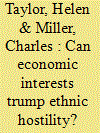

|
|
|
|
|
| Summary/Abstract |
Will China’s rise be peaceful? One of the key reasons for an optimistic outlook is the extensive economic ties which exist between China and its neighbors. According to a venerable strand of thought among policymakers and scholars alike, trading ties ought to foster bonds of amity among nations and thus reduce the chances of war. Here, we test this proposition using spatial economic data and survey research on opinion toward China as a security threat in Australia. The structure of Australia’s economy, its reliance on exports to China, and the concentration of these exports in a small number of sectors make it an ideal venue for such a test. Consistent with previous literature on public opinion and globalization, but in contrast to an individual interests based account of the trade–peace relationship, we find that outgroup hostility, not economic interdependence, is the key factor in shaping voters’ fears of a Chinese security threat.
|
|
|
|
|
|
|
|
|
|
|
|
|
|
|
|
| 3 |
ID:
184235
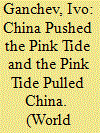

|
|
|
|
|
| Summary/Abstract |
This article examines the rise of leftist ideology in Ecuador and Bolivia in light of their deepening economic relations with China from 2005 to 2014. First, it reveals that market trends account for trade fluctuations but fail to explain Chinese investment in, and some loan deals with, Ecuador as well as loans to Bolivia. Second, it demonstrates how these forms of funding provided alternatives to U.S.-led international institutions, enabling Rafael Correa and Evo Morales to steer away from Western influence. Third, it contends that four factors led to a cyclic reinforcement of Chinese economic interests and the rise of leftist ideology in Ecuador and Bolivia, namely: mutual complementarity between China’s demand for energy/natural resource supply diversification and Pink Tide development agendas; U.S.–China geopolitical competition for influence in Latin America; China’s experience in engaging with leftist governments from developing countries; and anti-Americanism shaping national identity in Ecuador and Bolivia.
|
|
|
|
|
|
|
|
|
|
|
|
|
|
|
|
| 4 |
ID:
164778
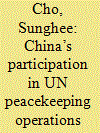

|
|
|
|
|
| Summary/Abstract |
Although China’s active participation in United Nations (UN) Peacekeeping Operations as a personnel contributor has drawn people’s attention, very few have examined under what conditions China sent its personnel in general. This article analyzes 18 cases of China’s participation/nonparticipation during 2003–2017, using such data as UN resolutions, data on trade and security, and other states’ involvement. It reveals that the consideration of economic interests is a better predictor for China’s behavior than China’s concerns over its reputation, the insecurity of places, or mission characteristics. However, in contrast to popular speculations, economic interests are more about the importance of host states as export markets rather than as exporters of resource-related materials. The study also finds that sovereignty issues still wield power over China’s decisions, showing that despite its increasing lenient voting patterns on mission resolutions, its participation behavior tends to remain conservative.
|
|
|
|
|
|
|
|
|
|
|
|
|
|
|
|
| 5 |
ID:
173937
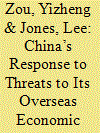

|
|
|
|
|
| Summary/Abstract |
Chinese firms have acquired enormous overseas interests since 2000. As relative latecomers to global markets, they often invest in territories subject to high political risk, which is often heightened by poorly regulated Chinese practices. This article describes these risks to China’s growing overseas economic interests and explores China’s response to them. First, the Chinese party-state is gradually softening its insistence on ‘non-interference’, intervening to secure Chinese economic interests overseas. Second, Chinese actors are seeking to cultivate greater consent among social forces in key states. This partial convergence with the practices of other major capitalist states has important implications for debates on China’s rise. These arguments are illustrated through a case study of Chinese engagement in Myanmar after 2011.
|
|
|
|
|
|
|
|
|
|
|
|
|
|
|
|
| 6 |
ID:
133294


|
|
|
|
|
| Publication |
2014.
|
| Summary/Abstract |
Large-scale deployment of low-carbon energy technologies is crucial to mitigating climate change, and public support is an important barrier to policies and projects that facilitate deployment. This paper provides insights to the origins of public opposition that can impede the adoption of low-carbon technologies by investigating how perceptions are shaped by local economic interests and individual cultural worldviews. The research considers both carbon capture and storage and wind energy technologies because they differ in maturity, economic impact and resource base. Further, for each technology, the research examines support for two types of policies: deployment in local community and public funding for research and development. Results indicate the influence of economic interests and cultural worldviews is policy specific. Individual cultural worldviews do not affect support for the deployment of technology, but they do significantly influence a person×s support for publicly funded research and development. Conversely, local economic interests have a significant role in determining support for deployment, while they do not affect support for research and development.
|
|
|
|
|
|
|
|
|
|
|
|
|
|
|
|
| 7 |
ID:
083746
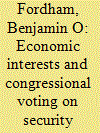

|
|
|
|
|
| Publication |
2008.
|
| Summary/Abstract |
Most research on congressional consideration of foreign and defense policy concludes that ideology is the most important influence on roll-call voting and that constituent economic interests are not very important. This article challenges this conclusion on two grounds. First, most previous research conceives of constituent economic interests on these issues very narrowly, examining only the benefits constituents obtain from providing military goods and services rather than their economic stakes in the broader goals of national security policy. Second, the effect of ideology on congressional voting has changed enormously over time, a fact that poses difficulties for research that has stressed this consideration. The effects of broader economic interests and the changing implications of ideology are tested using a sample of key Senate votes on military resource allocation, intervention, and foreign aid from 1947 through 2000.
|
|
|
|
|
|
|
|
|
|
|
|
|
|
|
|
| 8 |
ID:
132736


|
|
|
|
|
| Publication |
2014.
|
| Summary/Abstract |
Are preferential trade agreements (PTAs) in the Asia-Pacific region merely a political phenomenon with no economic basis, as some critics say? I challenge this interpretation; in this article I present an explanatory model based on intra-industry trade to indicate what economic interests should drive Japanese and South Korean PTAs with ASEAN partners, and derive specific predictions. An analysis of the actual tariff barrier elimination in the agreements suggests important, but highly specific, economic benefits. First, preference margins are substantively greater for intra-industry trade, and second, intra-industry trade is much less likely to be excluded from tariff reductions when imported into Japan or South Korea. This indicates that PTAs help firms specialize their production throughout the region, and provides an economic rationale for these agreements. A qualitative case study of the Japan-Malaysia PTA and a statistical analysis of tariff liberalization in the PTAs of Japan and South Korea with the ASEAN countries support this view.
|
|
|
|
|
|
|
|
|
|
|
|
|
|
|
|
| 9 |
ID:
085918
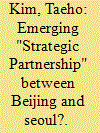

|
|
|
|
|
| Publication |
2008.
|
| Summary/Abstract |
In light of the extensive ties between Beijing and Seoul-now termed as a "strategic cooperative partnership"- as well as of the growing importance of China on peninsular and regional affairs, how would the China factor play out in South Korea's future security environment and in the evolving U.S-South Korean relationship?
|
|
|
|
|
|
|
|
|
|
|
|
|
|
|
|
| 10 |
ID:
142419


|
|
|
|
|
| Summary/Abstract |
Relations between the European Union (EU) and regional subgroups in Latin America (Mercosur, the Andean Community and Central America) are clear examples of ‘pure interregionalism’ and provide evidence of the EU's active promotion of regional integration. Within the context of these cases, this article explores what type of international power the EU wields, how interregionalism is embedded in that power, and how it is deployed. Combining strands of literature on EU–Latin American relations, interregionalism, EU external policy and power provides a framework within which interregionalism can be understood as an important normative and practical tool for the EU's external power projection. Drawing on official documentation and interviews with key individuals, the paper highlights the EU's articulation of power in interregional relations and reflects upon its mixed success. It concludes that, while imperial qualities and aspirations can be observed in the EU's penchant for interregionalism, the transformative power of the EU remains limited.
|
|
|
|
|
|
|
|
|
|
|
|
|
|
|
|
| 11 |
ID:
073664


|
|
|
| 12 |
ID:
108668


|
|
|
|
|
| Publication |
2011.
|
| Summary/Abstract |
What happens to EU (European Union) foreign policy when the EU has military force at its disposal? Will it then still be correct to talk of the EU as a 'normative' power, or will military capabilities make the EU more inclined to act as a traditional great power and instead promote its interests on the world scene? This article aims to contribute to an answer by studying why the EU launched its first naval operation, operation Atalanta. The analysis suggests that taking responsibility for the long-term protection of humanitarian aid to Somalia was a mobilizing argument behind Atalanta and that this has been followed up in practice. Opposed to what one would expect of a traditional actor, the EU has not prioritised to protect European ships and has bound itself to global law when using force against pirates. Piracy is defined as criminal acts and pirates have been treated in accordance with their human rights.
|
|
|
|
|
|
|
|
|
|
|
|
|
|
|
|
| 13 |
ID:
112460
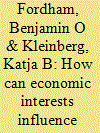

|
|
|
|
|
| Publication |
2012.
|
| Summary/Abstract |
Recent research on the sources of individual attitudes toward trade policy comes to very different conclusions about the role of economic self-interest. The skeptical view suggests that long-standing symbolic predispositions and sociotropic perceptions shape trade policy opinions more than one's own material well-being. We believe this conclusion is premature for two reasons. First, the practice of using one attitude to predict another raises questions about direction of causation that cannot be answered with the data at hand. This problem is most obvious when questions about the expected impact of trade are used to predict opinions about trade policy. Second, the understanding of self-interest employed in most studies of trade policy attitudes is unrealistically narrow. In reality, the close relationship between individual economic interests and the interests of the groups in which individuals are embedded creates indirect pathways through which one's position in the economy can shape individual trade policy preferences. We use the data employed by Mansfield and Mutz to support our argument that a more complete account of trade attitude formation is needed and that in such an account economic interests may yet play an important role.
|
|
|
|
|
|
|
|
|
|
|
|
|
|
|
|
| 14 |
ID:
126776
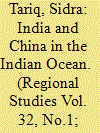

|
|
|
| 15 |
ID:
114916
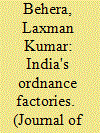

|
|
|
|
|
| Publication |
2012.
|
| Summary/Abstract |
The ordnance factory organization has grown over the years and now consists of 39 factories with two more being set up. The organization, which dates back to the eighteenth century, has however not been able to rise up to the expectation of its prime customer. The paper argues that for the organization to be able function more efficiently, its management needs to be corporatised, as suggested by many, particularly the Kelkar Committee. At the same time, the organization has to assume higher responsibility with respect to R&D investment, execution of contracts, quality assurance and exports, in order to remain competent in its area of functioning.
|
|
|
|
|
|
|
|
|
|
|
|
|
|
|
|
| 16 |
ID:
123384
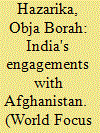

|
|
|
|
|
| Publication |
2013.
|
| Summary/Abstract |
For more than a decade, Afghanistan has been a hotspot on the world political map. With 2014 looming large in the horizon, countries around the world are bracing themselves for any negative fallout of the troop withdrawal. The foreign troop involvement, according to some has been protracted while others note that their job remains unfinished.
|
|
|
|
|
|
|
|
|
|
|
|
|
|
|
|
| 17 |
ID:
125239
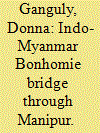

|
|
|
|
|
| Publication |
2013.
|
| Summary/Abstract |
Contemporary Indian foreign policy focuses on the promotion of her economic interests for which she believes that securing security within her immediate neighbourhood is extremely important. Further economic and military security combined together can only aid in India's rise in the game of international power politics. India not only shares land and maritime boundaries with eight countries- Bangladesh, Bhutan, China, the Maldives, Myanmar, Nepal, Pakistan and Sri Lanka, but also shares close historical, linguistic, religious, ethnic and cultural relationships. Hence, one of the cornerstones of India's stated foreign policy, though not a notably successful one to date, has been to build a strategically secure, politically stable, harmonious and economically cooperative neighbourhood. Moreover in the present era improving connectivity linkages with the neighbouring countries has assumed a singular dimension in India's neighbourhood diplomacy.
|
|
|
|
|
|
|
|
|
|
|
|
|
|
|
|
| 18 |
ID:
132528


|
|
|
|
|
| Publication |
2014.
|
| Summary/Abstract |
Turkey is a negotiating candidate for the EU membership. Though the accession negotiations between Turkey and the EU continue in the official sense, in reality, the relations are in a deadlock. It is often argued that Turkey-EU relations have entered a new era since January 2013, and new optimistic comments have emerged. This paper argues that there exists a pull-push balance in the accession process for the EU that normally attracts candidates and makes them more vulnerable to the EU conditions. The success of the political transformation of eastern European states relied to a large extent on the balanced pull-push accession processes. It is argued here that this balance for Turkey has been deteriorated and this fact has made the EU ineffective in transforming Turkish politics and polity. Therefore, this paper argues for the re-establishment of the balance to improve and normalize Turkey-EU relations.
|
|
|
|
|
|
|
|
|
|
|
|
|
|
|
|
| 19 |
ID:
091411


|
|
|
|
|
| Publication |
2009.
|
| Summary/Abstract |
Since it came back into power in May 2008, the Berlusconi government has undertaken a number of important initiatives in foreign policy, especially in relation to the European Union. Three cases concern the ratification of the Lisbon Treaty, the war in Georgia and the climate change/energy package. Rather than following a pro- or anti-Europe line, it is argued that the link between all these initiatives is the development of a pragmatic foreign policy, in which the ultimate aim is to promote Italy's economic interests. This means that in some cases the Berlusconi government is supportive of the European integration process, especially when no specific Italian interest is at stake, whereas it does not hesitate to undermine it should it clash with Italy's economic interests.
|
|
|
|
|
|
|
|
|
|
|
|
|
|
|
|
| 20 |
ID:
126239
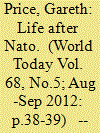

|
|
|
|
|
|
|
|